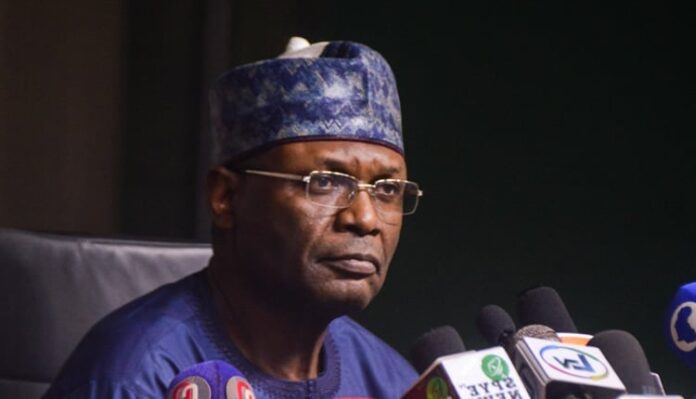ABUJA: President Bola Tinubu has formally accepted the departure of Professor Mahmood Yakubu as Chairman of the Independent National Electoral Commission (INEC) following the completion of his second and final term in office.
Yakubu, who officially handed over to National Commissioner May Agbamuche-Mbu as Acting Chairman on Tuesday, exits after a decade of steering Nigeria’s electoral body through two general elections and several reforms.
The President is expected to name Yakubu’s substantive successor after Thursday’s Council of State meeting in Abuja, where he will present nominees for consultation and advice.
In appreciation of Yakubu’s service, Tinubu conferred on him the national honour of Commander of the Order of the Niger (CON).
In a statement issued by the Special Adviser to the President on Information and Strategy, Bayo Onanuga, Tinubu expressed gratitude to Yakubu for his role in consolidating Nigeria’s democracy through the conduct of free and fair elections during his tenure.
“President Tinubu thanked Professor Yakubu for his services to the nation and his efforts to sustain Nigeria’s democracy, the statement read.
In recognition of his dedicated service, the President has bestowed on him the honour of Commander of the Order of the Niger.
Tinubu also directed that Yakubu hand over to the most senior National Commissioner, May Agbamuche-Mbu, pending the appointment of a substantive chairman.
In a letter dated October 3, 2025, Yakubu thanked the President for the privilege of leading the commission for two consecutive terms.
Appointed in 2015 and reappointed in 2020, Yakubu became the first INEC chairman to serve two full terms in Nigeria’s democratic history.
During his tenure, INEC introduced key technological reforms, including the Bimodal Voter Accreditation System (BVAS) and the Results Viewing Portal (IReV), which enhanced transparency and voter verification.
He also oversaw the expansion of polling units nationwide, continuous voter registration, and initiatives to improve electoral access for persons with disabilities, the elderly, and internally displaced persons.
Despite these strides, his leadership faced criticism following technical glitches during the 2023 general elections, which sparked public debate over credibility and transmission delays.
Amid discussions on who should appoint the next INEC chairman, Senior Advocate of Nigeria (SAN), Ifedayo Adedipe, described the debate as misplaced, stressing that election credibility depends more on the integrity of political actors than on the appointing authority.
“Was it not Jonathan who appointed Professor Jega? Didn’t Jonathan lose the election? The focus should be on conduct, not on who appoints whom, he argued.
Another SAN, Adedayo Adedeji, maintained that the Constitution empowers the President to make such appointments, subject to Senate confirmation.
Section 153 and 154 of the Constitution are clear on this, he said, adding that proper vetting by the legislature ensures accountability.
Similarly, Wale Balogun, SAN, urged a transparent selection process, noting that while the system provides checks and balances, it remains too weak to prevent abuse if the President appoints a non-credible person.
At a stakeholders’ meeting with Resident Electoral Commissioners in Abuja, Yakubu said his decision to step aside complied with Section 306 (1) and (2) of the 1999 Constitution (as amended).
He praised INEC staff and partners for their dedication, adding that he was proud of the commission’s progress despite challenges.
I hand over to one of the most senior National Commissioners, May Agbamuche-Mbu, pending the appointment of a substantive chairman, Yakubu stated.
I hope this will give the appointing authorities enough time to name a successor and allow the new chairman to settle quickly into the task ahead.
He presented two publications summarizing his tenure Election Management in Nigeria 2015–2025 and Innovations in Electoral Technology 2015–2025 before signing his handover notes.
Yakubu confirmed that INEC had already commenced early preparations for the 2027 general elections, alongside scheduled off-cycle polls in Anambra (November 2025), FCT (February 2026), Ekiti (June 2026), and Osun (August 2026).
He said the commission would focus on cleaning up the voters’ register, reviewing polling unit locations, managing party primaries, and improving logistics, while awaiting the passage of a new Electoral Act before the National Assembly.
Agbamuche-Mbu, the new Acting INEC Chair, is a seasoned legal practitioner with over three decades of experience in corporate and public law.
A native of Delta State, she holds degrees from Obafemi Awolowo University, the University of London (Queen Mary and Westfield College), and is a Solicitor of the Supreme Court of England and Wales.
She previously served as Secretary of the Chartered Institute of Arbitrators (Nigeria branch) and contributed to national committees on solid minerals and project assessment before joining INEC in 2016.
Meanwhile, Speaker of the House of Representatives, Tajudeen Abbas, has pledged the National Assembly’s commitment to fast-tracking electoral, constitutional, and security reforms ahead of the 2027 elections.
Addressing lawmakers on resumption from recess, Abbas said the Electoral Act Amendment Bill aims to reduce election disputes, cut costs through single-day voting, and enhance inclusion for women and persons with disabilities.
“Our goal is to make elections less contentious and more credible,” he said. He also reiterated the need to finalise pending constitutional amendments, including those on devolution of powers, local government autonomy, and judicial reforms, before December 2025.
Abbas further emphasised the urgency of security reforms and economic revitalisation, noting that Nigerians expect “deliberate legislative actions that improve their daily lives.”



